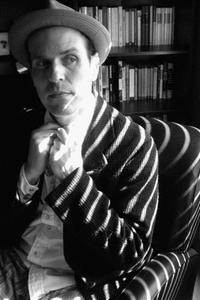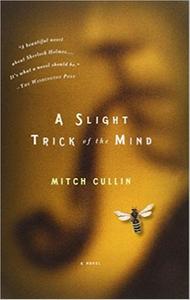
A Slight Trick of the Mind has recently been made into a film about Sherlock Holmes in old age, Mr. Holmes, starring Ian McKellen and directed by Bill Condon of Gods and Monsters, Chicago and Dreamgirls fame. How did the novel come about?
David Bowie told me to do it in a dream. Seriously, though, I always wanted to create my own take on Sherlock Holmes since I was a boy, but it wasn't until my father began showing signs of memory loss that I felt the need to explore the character as someone following the same trajectory as my dad. That is why themes of memory, and how memory defines us, are integral to the story, as is the underlying motif of lost father figures.
How did the book become a movie?
Well, it was a 10-year journey. In fact, the book was optioned for film before it was ever published, way back in 2003 or 2004. Over the years, it has been lurking there as an almost-project that never quite took off, so I didn't think much about it, to be honest. It's easier that way. So when I did get the call back in 2012 that McKellen was aboard, I had to stay mum, cross my fingers and hold my breath until it was officially announced in late 2013.
 Were you involved in the screenplay?
Were you involved in the screenplay?
Not at all, and by choice. I did read several of Jeffrey Hatcher's drafts of the script over the years, and I always offered my notes and general thoughts. However, the book is the book, and the film is the film, so I felt that my job had already been done long ago.
Did you get to visit the set?
I did, yes, while they were shooting in England last summer. That was a lot of fun. It was absolutely surreal to be in the presence of McKellen as Holmes, and stranger still to hear him speaking words at the manor house where Queen Elizabeth the First was born and to realize then that I wrote those specific lines in a rundown apartment in Tucson, Arizona.
How do you feel about the final product? Were you sorry to see your original book title changed?
I'm beyond pleased with the film. It really is a wonderful movie, and I won't be surprised one bit if McKellen is nominated for an Oscar. The title change doesn't bother me at all, especially since I was consulted and involved in picking the new name. In fact, for years the title of the French edition of the book has been Les Abeilles de monsieur Holmes, or The Bees of Mr. Holmes, so name changes aren't anything new. Plus, I think Mr. Holmes makes a nice counterpoint to Benedict Cumberbatch's younger Sherlock of PBS fame.
A few years ago Terry Gilliam adapted your novel Tideland, starring Jeff Bridges, into a film. Was that experience different from the filming of Mr. Holmes?
The process is the same in that I took a hands-off approach where the film was concerned. The main difference, perhaps, was that I was consulted regularly by Terry Gilliam about various ideas and, of course, I did have a wee cameo in Tideland and I did co-write a couple of songs that appeared in the movie. That said, Mr. Holmes went through several directors and actors before settling on Condon and McKellen. Tideland, on the other hand, was always Gilliam's twisted feral child.
You started out publishing with small presses and then were picked up by a major New York house. Tell us about that.
Well, the most obvious difference between the two is that with the larger house there was more money involved. Yet with the smaller presses there was always a sense of flying under the radar with a pretty devoted crew. With the bigger houses, a writer is nothing more than an abstract commodity that can be written off if a given book fails to meet its expectations. With the smaller presses, you might be afforded a second chance or even a third chance if the reviews are good though the book doesn't sell that well. With the bigger houses things are very impersonal, and with the smaller presses, a writer sometimes has to deal with the oversized egos of control-freak little publishers, and vice versa, and it can get very personal.
What's next on your schedule, a Holmes sequel?
I think ol' Sherlock & I have split for good, amicably though. I have done what I wanted with him and, while I've been asked to revive my version of the character several times, to do more would be forced and less organic in nature. Plus, what else could I do with him other than have him decompose in a chair? I suppose I could say the same thing about my career as a novelist. It has run its course, and I'm ready to move on to other creative efforts, such as photography and photo essays. The highs, for me, as a fiction writer have been wonderful, but the lows have been awful, at best. I think Mr. Holmes is a nice disembarkation point for me to walk off the stage with a perfect sense of completion as a novelist. --Tom Lavoie, former publisher

